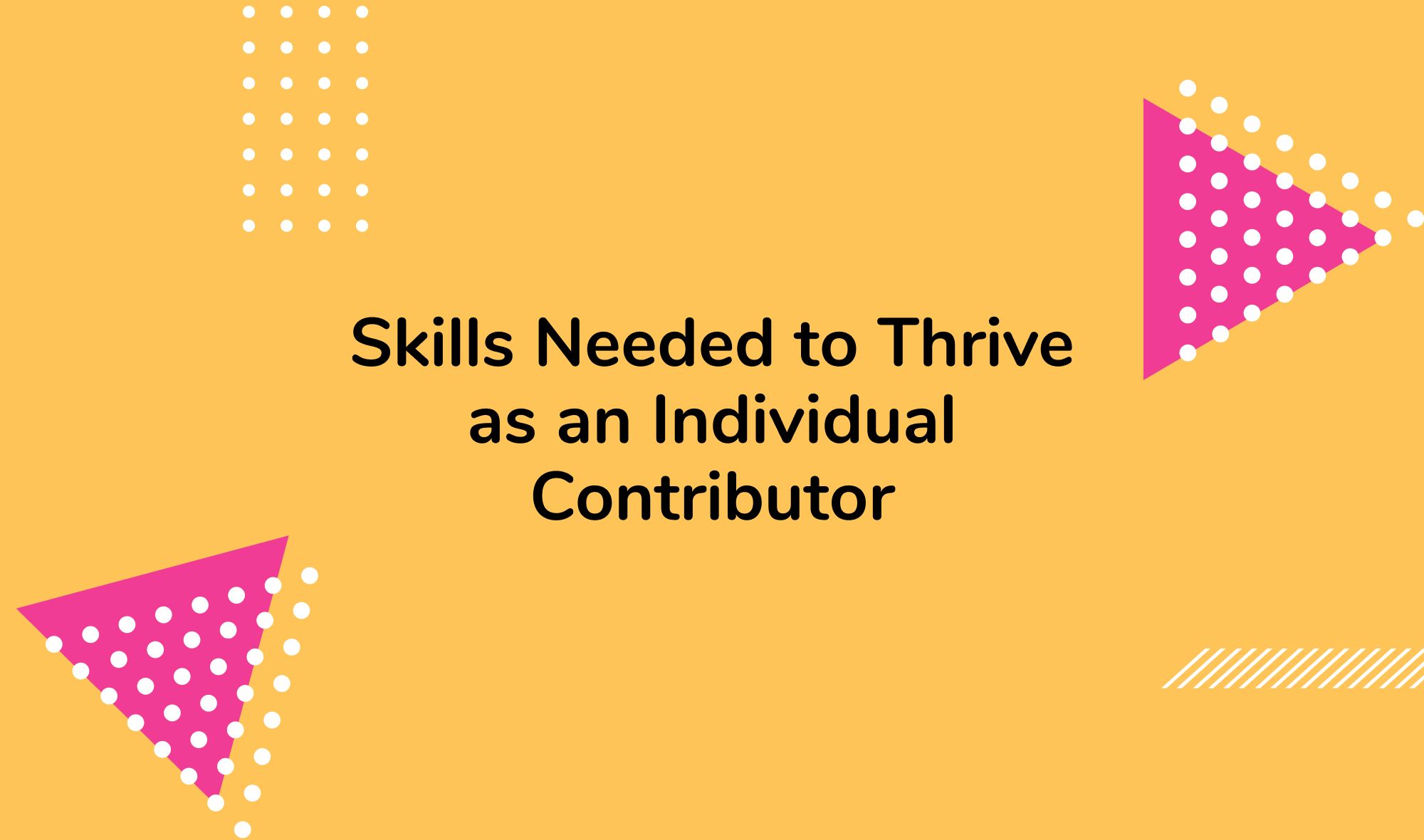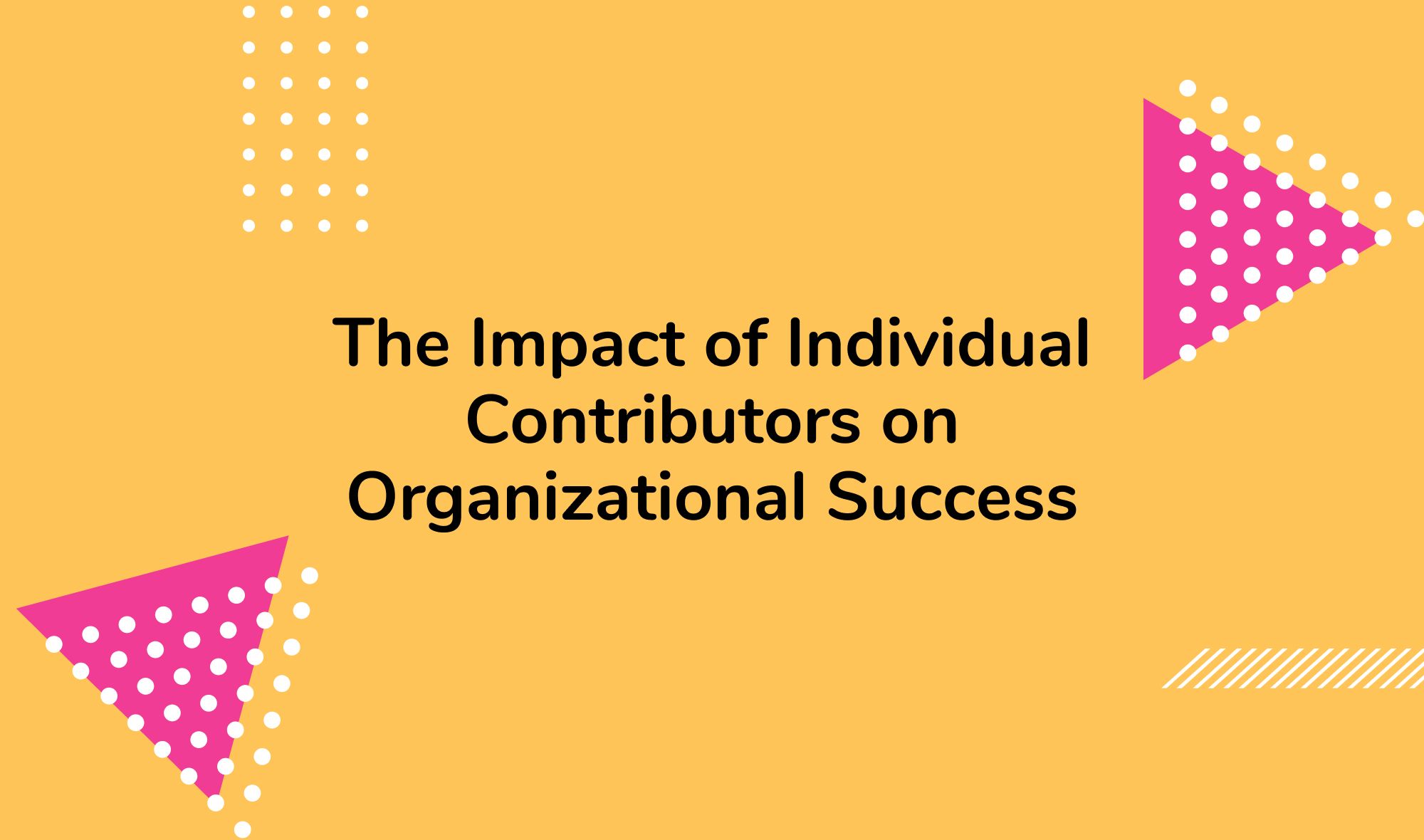Unleashing Potential: The Power of an Individual Contributor
By Marco Franzoni • June 22, 2023
Key Takeaways
- An individual contributor plays a crucial role in an organization's success.
- They have distinct roles, separate from management, and require certain skills to thrive.
- Individual contributors can significantly impact team dynamics and morale.
- The role of an IC presents unique challenges and rewards.
- There are effective strategies for enhancing performance in an IC role.

Ever wondered about the potential career paths a software engineer might explore beyond their individual contributor role? Or perhaps you're a seasoned individual contributor, or IC, intrigued by what management responsibilities might offer, but aren't quite ready to trade your daily deep dive into code for a fully-fledged management position just yet. We know, the journey from an individual contributor to a leadership role is not always a straightforward and logical way. It requires gaining a deeper understanding of the broader skills needed beyond your specialized skills as a software engineer.
Whether you’re an aspiring leader, an HR professional looking to support your team, or a senior engineer, it's crucial to understand how to navigate these waters effectively. Having clarity about your career path can help you achieve your career goals in a timely and responsible manner. In this article, we will explore the different paths for individual contributors, the importance of management responsibilities, and how leading projects encourages ICs to gain valuable experience.
We will also highlight ways to boost retention by ensuring each individual contributor is appropriately challenged and satisfied in their role, and how a supportive work environment can contribute to the professional development of software engineers.
So, if you're an individual contributor curious about how to expand your role or an HR leader looking for strategies to support your team members' career paths, this guide is for you. Buckle up, as we're about to take a deep dive into the world of individual contributors and the journey towards leadership roles.
Join our Newsletter
Transform your career with our personal growth insights. Get one valuable tip right in your inbox every Saturday morning.
The Role of an Individual Contributor: Unveiling the Power
Being an individual contributor often implies a deep knowledge and mastery of certain specialized skills. A software engineer, for example, may spend their day solving complex issues, working on a codebase, and collaborating with cross-functional partners. Here's a closer look at the life of an individual contributor.
In-depth look at an individual contributor’s responsibilities
Individual contributors are often the driving force behind a company's product or service. They are experts in their respective fields, possessing a unique set of hard and soft skills that enable them to excel in their specialized work. This includes but is not limited to, their technical know-how and ability to execute projects in a straightforward and logical way. Individual contributors are expected to manage their own tasks and deliver consistent results in a timely and responsible manner. They directly contribute to the team's success by completing their day to day tasks and accomplishing group goals. For a more in-depth understanding of an individual contributor's role and responsibilities, you might find this book, Engineering Management, insightful.
Distinguishing IC roles from management responsibilities
While individual contributors excel at their specific tasks, management responsibilities involve a different skill set. Managers, or those in a managerial role, handle a broader scope of duties. They're responsible for leading projects, managing a team, and setting group goals. They often serve as the bridge between individual contributors and the company's high-level strategy. For more insights on the significant role of a middle manager in an organization's growth and success, you may want to read our blog post, The Secret Weapon to Your Organization's Growth and Success: A Middle Manager.
In addition, they have direct reports and need to develop working relationships with other teams, like the sales team. But how exactly does an individual contributor role differ from a managerial role? We shed some light on this subject in our blog post on Demystifying the Middle Manager.
Navigating the transition from an individual contributor role to a managerial role involves developing a new set of skills, embracing more responsibilities, and adopting a different mindset. The following sections will delve deeper into this transition.
Skills Needed to Thrive as an Individual Contributor

An individual contributor's role demands more than just specialized skills. They also need to be well-versed in certain soft skills like time management, responsibility, and communication. Let's dive into the specifics.
The Importance of Managing One's Own Tasks
Individual contributors must be adept at managing their own tasks. This involves setting goals, estimating time frames, and executing projects in a timely and responsible manner. The ability to manage tasks efficiently not only contributes to personal productivity but also plays a vital role in ensuring team success and delivering consistent results. This is where professional development can play a crucial role. It equips individual contributors with the tools and strategies they need to effectively plan and manage their tasks. To learn more about how you can boost your productivity through professional development, read our post on Investing in Professional Development.
Timely and Responsible Manner: The Key to Successful Individual Contribution
The way an individual contributor manages their time directly impacts their performance and overall contribution to the team. Delivering tasks in a timely and responsible manner is, therefore, of utmost importance. But what does this mean exactly? It involves being dependable, meeting deadlines, and producing high-quality work consistently.
In The Manager's Path, the author further elaborates on how effective time management and a sense of responsibility can greatly impact an individual contributor's career.
The Impact of Individual Contributors on Organizational Success

When we consider the success of an organization, it's easy to attribute it to the leadership team or the managerial roles. However, the value and impact of individual contributors often go unappreciated. Let's dive deeper to understand the critical role they play in an organization's success.
Real-Life Examples of Individual Contributors Driving Success in Companies
In every successful organization, you can find numerous examples of individual contributors who have made significant impacts. Consider software engineers in tech firms or sales team members who exceed targets - they all directly contribute to the success of the organization in their own ways. They bring deep knowledge and specialized skills to the table, solving complex issues and driving even more complex initiatives.
Furthermore, individual contributors often have the freedom to focus on their specialized work without management responsibilities. This allows them to solve problems in a straightforward and logical way, thus driving innovation and progress.
Exploring the Less Visible Impacts of Individual Contributors on Team Dynamics and Morale
Individual contributors play an equally significant role when it comes to team dynamics and morale. They often set the tone for the work environment, influence the team's morale, and shape the company culture. A committed individual contributor who executes tasks in a timely and responsible manner not only contributes to the group goals but also fosters a supportive work environment that boosts retention.
We delve deeper into this aspect in our post Redefining Success: An In-Depth Look at Career Development, where we discuss the subtle yet profound influence of individual contributors on the success of an organization.
The Challenges and Rewards of Being an Individual Contributor

The role of an individual contributor is not without its challenges, but it's equally rich in rewards. Let's explore some of these hurdles and benefits that individual contributors often experience.
Balancing Autonomy and Collaboration: The Everyday Challenges of an IC
Being an individual contributor means having the autonomy to manage one's own tasks. However, balancing this independence with the need for collaboration can sometimes be challenging. ICs often need to work in group projects, where aligning individual contributions towards a common group goal can be tricky. This balance requires soft skills and technical skills alike, making it a constant learning process.
In her book, "Radical Candor," Kim Scott delves into the delicate dance of autonomy and collaboration that individual contributors must navigate daily. She provides actionable advice to master this balance effectively.
Join our Newsletter
Transform your career with our personal growth insights. Get one valuable tip right in your inbox every Saturday morning.
The Satisfaction and Growth Opportunities Derived from IC Roles
Despite these challenges, being an individual contributor is rewarding on many fronts. There is a unique satisfaction that comes from owning your work and seeing your ideas come to fruition. You can directly contribute to the organization's success and know that your hard work is paying off.
Moreover, IC roles provide a wide array of growth opportunities. Leading projects encourages ICs to gain valuable experience and develop broader skills, from estimating time frames to developing plans and executing projects. This valuable experience can be a stepping stone towards even more complex roles or towards a management track, depending on your career goals.
To learn more about maximizing the growth opportunities in IC roles, visit our blog post on Navigating Your Career Path: Essential Steps for Success.
Making the Most of Your Role as an Individual Contributor

Being an individual contributor presents numerous opportunities for personal and professional growth. To make the most of your role, consider the following strategies to enhance your performance and unlock your potential.
Strategies to Enhance Performance and Maximize Potential as an IC
As an individual contributor, you possess unique talents and specialized skills that add significant value to the organization. Maximizing your potential involves effectively planning, identifying goals, and managing your tasks in a responsible manner. Leading projects or contributing to group goals enables you to demonstrate your ability to deliver consistent results.
To gain a deeper insight on how to boost your performance as an individual contributor, take a look at our post on Boosting Business Performance: Certification Programs for Training and Development.
Leveraging Soft Skills for Success
While technical skills are critical for individual contributors, especially in roles like software engineer or senior engineer, soft skills play an equally important role in your success. These include communication, collaboration, and emotional intelligence, among others. Soft skills enable you to work efficiently with cross-functional partners, manage complex initiatives, and solve complex issues in a straightforward and logical way.
John Sonmez's book, "Soft Skills: The Software Developer's Life Manual" provides a comprehensive guide to soft skills needed for success as an individual contributor.
Moreover, our post on Unlocking Professional Success with Soft Skills Training discusses the role of soft skills in detail, making it a must-read for individual contributors seeking to boost their effectiveness in the workplace.
Transitioning from Individual Contributor to Leadership: Is it for You?

Stepping up from an individual contributor role to a leadership position is a significant career decision that requires careful thought and evaluation. This section aims to guide you through this crucial process.
Evaluating Whether the Shift from IC to Leadership is the Right Career Move
As an individual contributor, you may find yourself considering a shift towards a leadership or management role. Before making this transition, it is essential to assess whether this shift aligns with your career goals and personal strengths. Leadership roles often involve more responsibilities, including people management and setting the direction for the team. On the other hand, individual contributor roles focus more on specialized work and subject matter expertise.
To help you better understand the traits and behaviors effective leaders exhibit, consider reading our post on Leadership Behaviors. This will provide valuable insights and may assist in your decision-making process.
How to Make the Transition Smoothly, If Desired
If you've decided that transitioning into a leadership role is the right move, the next step is to plan your course of action. This may involve honing your managerial skills, seeking mentorship, and potentially embarking on professional development programs.
One resource that may assist in this transition is Jeff Goins' book, "The Art of Work", which offers a unique perspective on discovering your calling and effectively navigating career transitions.
Conclusion
In conclusion, the role of an individual contributor is integral to the success of any organization. From their specialized skills to their ability to execute tasks in a timely and responsible manner, individual contributors bring a unique blend of talents that help drive a company's growth and success. Whether you're just starting your journey as an IC, contemplating a leadership role, or seeking ways to improve in your current role, this guide offers valuable insights into the individual contributor path.
If you found this information helpful and are keen to explore more, we recommend checking out the following resources:
- "Engineering Management": An insightful book that offers practical advice for anyone looking to enhance their skills as an individual contributor in the engineering field.
- Navigating Your Career Path: This blog post provides essential steps for success for any professional looking to maximize their career potential.
- "The Art of Work": A book that delves into discovering your calling and successfully navigating career transitions, ideal for those considering a move from an individual contributor role to leadership.
Remember, every career journey is unique and what works for one person might not work for another. Use this guide as a starting point and carve out a path that aligns best with your skills, passions, and long-term career goals.
Read more about: Professional Development